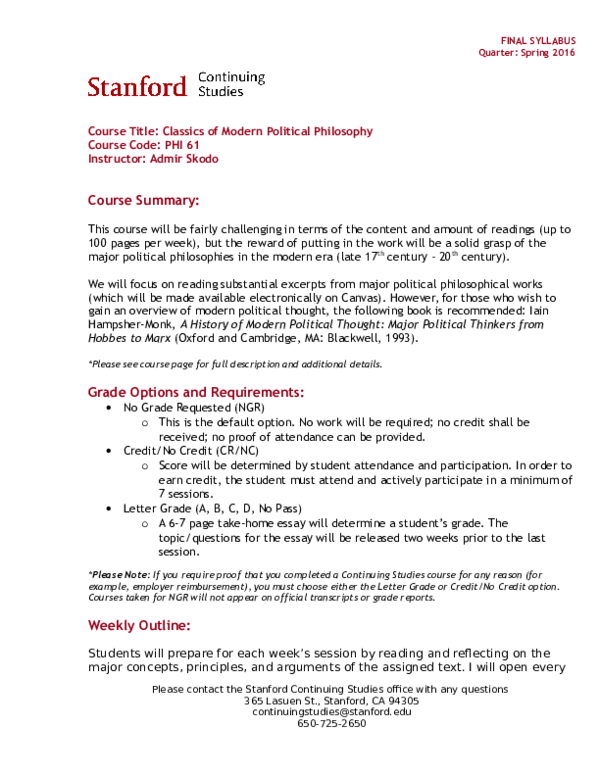Academia.edu no longer supports Internet Explorer.
To browse Academia.edu and the wider internet faster and more securely, please take a few seconds to upgrade your browser.
Classic of Modern Political Philosophy (Stanford): Course Syllabus
Classic of Modern Political Philosophy (Stanford): Course Syllabus
Classic of Modern Political Philosophy (Stanford): Course Syllabus
Classic of Modern Political Philosophy (Stanford): Course Syllabus
Classic of Modern Political Philosophy (Stanford): Course Syllabus
Related Papers
Course Description & Aim The rise of National Socialism to power prompted an unprecedented large-scale exodus of Central European scholars who have had an enormous impact on American cultural life in particular, and the post-World War II world of politics in general. The primary aim of the course is to introduce students to the key ideas and classical writings of these figures, and to examine their responses to and analysis of the age of extremes. We will begin our journey with the writings of Theodor Adorno, Herbert Marcuse and Erich Fromm – the founders of the Frankfurt School – and will continue with the analyses of totalitarianism and " political Messianism " offered by Hannah Arendt, Gershom Scholem, Jacob L. Talmon, and Karl Popper, which we will then compare and contrast with the evaluation of liberalism one finds in the writings of Leo Strauss, Isaiah Berlin, and Arthur Koestler. We shall examine these thinkers' analyses of enlightenment, nationalism, socialism, and totalitarianism, their life stories, and their direct and indirect role in creating a transatlantic political discourse in postwar years. We will try to ask ourselves to what extent were their political and philosophical writings designed as a response to the maladies of the twentieth century, and to what extent did their Jewishness notify their writings, if at all. By doing so we shall be able to contextualize historically the fundamental features of Jewish intellectual activity after 1945. *No prior knowledge of political science, philosophy and/or Jewish studies are required.
This is the syllabus for the second iteration of the second-year undergraduate History of Political Thought course I taught at Bristol in 2013-14.
Graduate course syllabus, McMaster University, Winter 2017
Ideologies that Shaped the World
Ideologies that Shaped the World.pdf2010 •
This module examines four of the principal modern political doctrines in some depth: liberalism, utilitarianism, socialism and Fascism as well as the concepts of justice and multiculturalism. Particular attention will be paid to the philosophical foundations of the doctrines, especially their different visions of the human condition, theories of human nature, their conception of society, their view of the state, and their assessment of the part to be played by politics in achieving the human good.
The purpose of this course is to introduce students to a variety of approaches and issues in political philosophy. Half of the class will be devoted to reading and commenting on primary texts such as: Plato’s Republic, Aristotle’s Politics, Machiavelli’s The Prince, Hobbes’s Leviathan, Rousseau’s The Social Contract, and Tocqueville’s Democracy in America. The other half focuses on the secondary literature. After examining in detail each of these classic texts, we shall explore various ways in which they have been interpreted by several main schools: contextualist (Quentin Skinner and his disciples), post-modern (Sheldon Wolin and his disciples), Straussian (Leo Strauss and his disciples), feminist (Susan M. Okin, etc.), and intellectual history (Isaiah Berlin etc.), and conceptual history (Koselleck). On a general level, this course has several pedagogical aims. First, it seeks to provide an overview of a few canonical texts and authors. Second, the course seeks to help students develop the capacity to engage in advanced textual exegesis and to critically evaluate alternative approaches and interpretive methods.
The Cambridge Companion to Isaiah Berlin, eds Joshua Cherniss and Steven B. Smith (Cambridge)
Isaiah Berlin on Marx and Marxism2018 •
An analysis of Berlin's interpretation of Marx and Marxism with special focus on his book Karl Marx (1939)
Provides Burdwan University Master of Arts Political Science Syllabus
Seventeenth-century political and juridical thinkers mined the Hebrew Bible, the Talmud, and rabbinic literature for ideas, examples and full-fledged political systems, aiming to apply them to modern Europe. This essay examines several political Hebraists of the seventeenth century, notably Petrus Cuneaus, John Selden, James Harrington and his fellow English republicans, and John Locke. The "Hebrew republic," the polity idealized by early modern Hebraists, is significant above all as a political and juridical model. The essay discerns three clusters of ideas reaped exclusively, or mainly, from Hebraic sources, and interwoven into modern political thought: (1)The importance of the rule of law within fixed borders: a concept of international borders underpinning a novel, natural-law-based theory of the state, law, and rights; (2) the idea of a federal republic, transformed from the tribal Israelite society to Dutch political thinking; and (3) the moral economy of republican social justice. Finally, the essay explains why jurists and political thinkers ceased to read the Bible as a historical and political text in the eighteenth century, and why the earlier legacy of political Hebraism could become valuable again today, both historically and politically.
RELATED PAPERS
2012 •
2013 •
In M. O’Neill and T. Williamson (eds), Property-Owning Democracy: Rawls and Beyond (Wiley-Blackwell, 2012), pp. 33-52
Property-Owning Democracy: A Short HistoryHistory of European Ideas
A Tale of Trees and Crooked Timbers: Jacob Talmon and Isaiah Berlin on the Question of Jewish Nationalism2008 •
Journal of Curriculum Studies
School syndrome: Understanding the USA’s magical belief that schooling can somehow improve society, promote access, and preserve advantage2012 •
Published in Marshall & Marshallians book (see below)
The History of Nations: Nationalism in Marshall's Political Economy2011 •
The Other Canon Foundation and Tallinn …
Production Capitalism vs Financial Capitalism-Symbiosis and Parasitism. An Evolutionary Perspective and Bibliography2011 •


 Admir Skodo
Admir Skodo